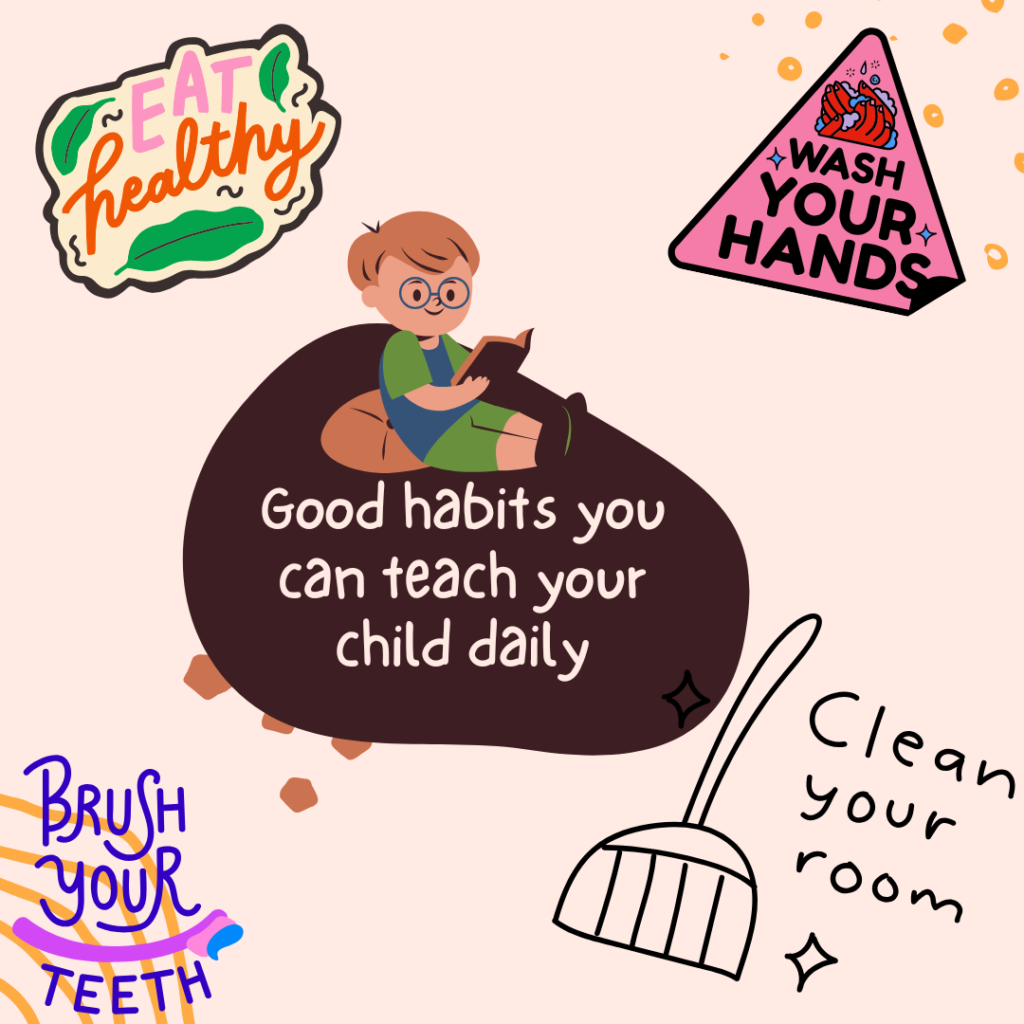From brushing their teeth to helping tidy up, young children benefit greatly from learning positive habits early in life. Healthy routines not only help kids develop independence but also establish a strong foundation for lifelong self-care and responsibility. Building these habits doesn’t have to be a chore—with a little creativity and patience, parents can make daily routines enjoyable and rewarding for children.
Here’s a guide with practical tips for nurturing good habits in young children, from hygiene to tidiness to healthy eating!
1. Make Brushing Teeth a Fun Ritual
Brushing twice a day is one of the most essential habits for kids to learn. However, for young children, it can feel like an unpleasant task. Making brushing fun and engaging is key to building this habit.
- Use a fun toothbrush with their favorite characters or one that lights up.
- Sing a song or play a tune that lasts for two minutes, so they know how long to brush.
- Brush together—let your child see you brushing your teeth so they understand it’s an important routine for everyone.
Consistently encouraging brushing in a positive way helps children see it as a rewarding and essential part of self-care.
2. Tidy Up Together and Make it a Game
Teaching kids to clean up their toys and space fosters responsibility and order. For little ones, cleaning up can feel overwhelming, so breaking it down into steps and adding an element of play can make a big difference.
- Turn tidying up into a game by setting a timer and challenging them to put away as many toys as they can before time’s up.
- Use a “Clean-Up Song” that cues them to start cleaning up.
- Give small tasks like “Let’s put all the blue toys away first” to keep it simple.
When kids associate tidying with fun and accomplishment, they’re more likely to participate willingly.
3. Encourage Healthy Eating through Choices and Fun Presentation
Building a habit of balanced eating can start early by introducing a variety of healthy foods in a fun and inviting way. Kids are more likely to try new foods when they feel involved and excited about the experience.
- Let kids help with meal prep—even simple tasks like washing vegetables or arranging food on a plate can make them feel invested in what they eat.
- Offer choices within healthy options, such as “Would you like carrots or cucumber sticks?” This gives them a sense of control while ensuring nutritious options.
- Get creative with presentation by making “fruit faces” or arranging veggies in fun shapes.
Introducing new foods in a positive way can foster a love for nutritious choices that lasts a lifetime.
4. Practice Positive Morning and Bedtime Routines
A good morning starts with a healthy routine that kids can look forward to. Similarly, an evening routine helps them wind down and prepare for restful sleep.
Morning Routine Tips:
- Create a fun checklist with visual reminders for things like washing their face, brushing teeth, and getting dressed.
- Use a reward system for younger kids, like stickers for completing their morning routine.
- Give praise for completing each task to build their sense of independence.
Bedtime Routine Tips:
- Wind down with calming activities like reading a bedtime story or talking about their day.
- Set a specific bedtime to help them get used to a regular sleep schedule.
- Let them choose a favorite stuffed animal to take to bed for comfort.
With consistent routines, children feel secure and understand what’s expected of them each morning and night.
5. Teach the Importance of Washing Hands and Staying Clean
Hand-washing is essential for health, and teaching this habit early can make a big impact on children’s hygiene.
- Make hand-washing fun by singing a 20-second song while they scrub.
- Show them how germs spread by doing a simple glitter experiment: put glitter on their hands and let them try to wash it off, showing that thorough washing is important.
- Use positive reinforcement—praise them each time they remember to wash their hands on their own.
When kids understand the importance of staying clean, they’re more likely to make it a habit.
6. Encourage Sharing and Kindness
Social habits, like sharing and showing kindness, are just as important as self-care routines. Developing these habits helps children learn empathy and builds social skills.
- Model sharing by sharing things at home and acknowledging when they do the same.
- Praise acts of kindness when you see them, even in small ways, to reinforce the behavior.
- Role-play situations with toys to demonstrate sharing, turn-taking, and thinking about others.
Teaching kindness early on helps children build strong, respectful relationships as they grow.
7. Be Consistent and Lead by Example
One of the most effective ways to instill these habits is by modeling them consistently. Kids are quick to notice when parents practice what they preach, so leading by example can make a lasting impact. When they see you brushing your teeth, tidying up, eating balanced meals, and washing your hands regularly, they understand that these are important parts of daily life.
Building Good Habits for a Bright Future
Developing positive habits is about more than just good behavior—it’s about empowering children with the skills they need to feel confident, healthy, and responsible as they grow. By making routines fun, consistent, and age-appropriate, parents can foster a love for self-care and responsibility that children carry into the future.
Each small step—whether it’s a smile of encouragement after they brush their teeth or a high-five for helping clean up—builds the foundation for a lifetime of healthy, positive habits.

